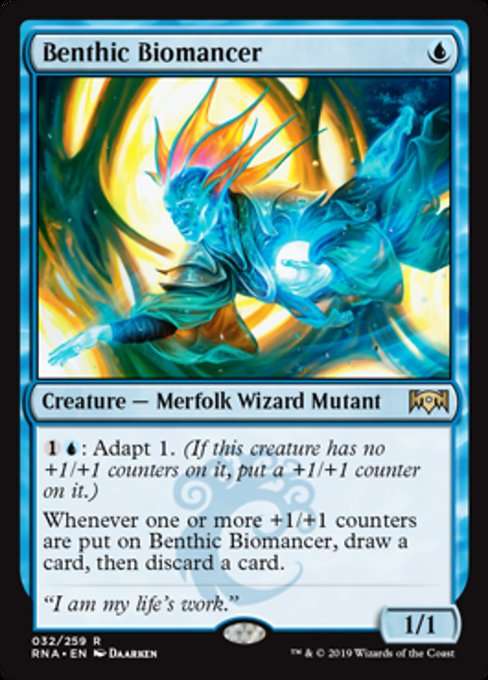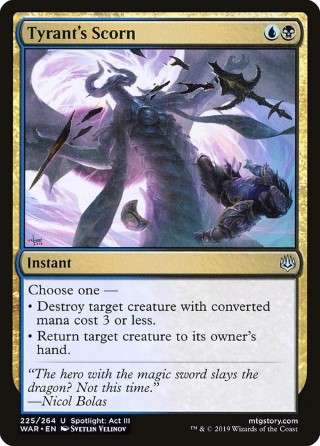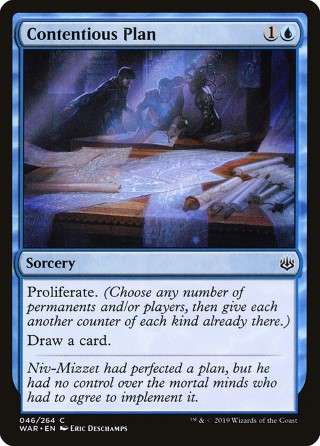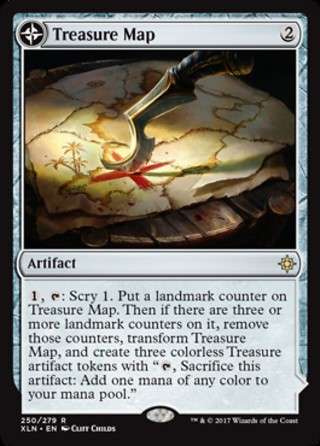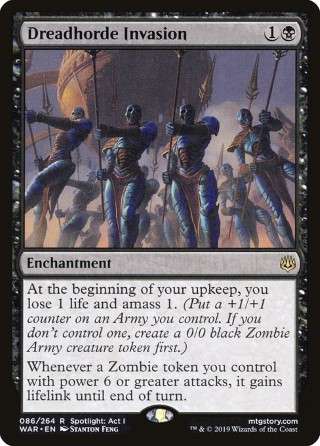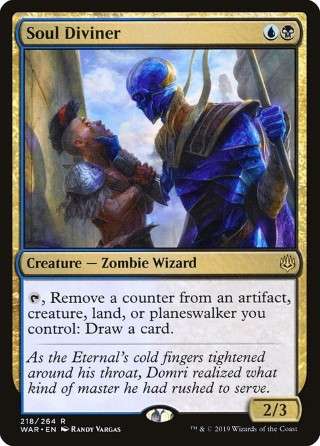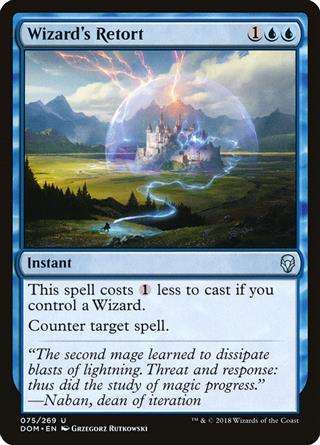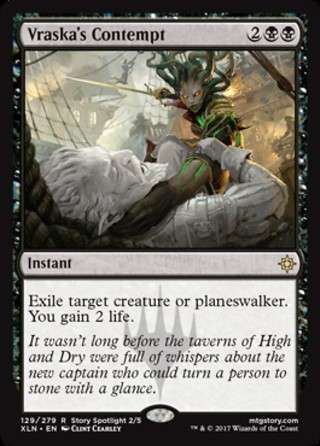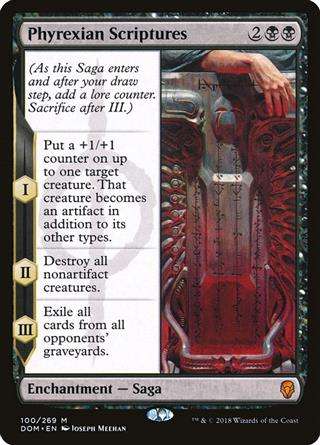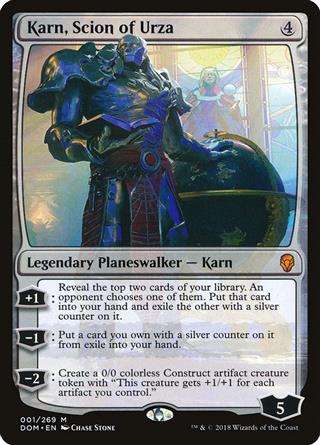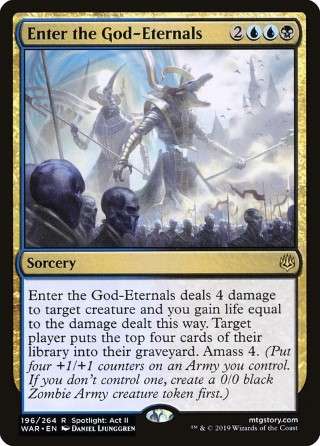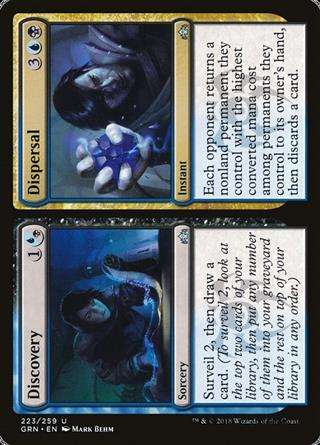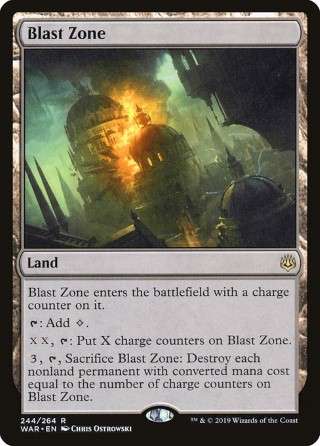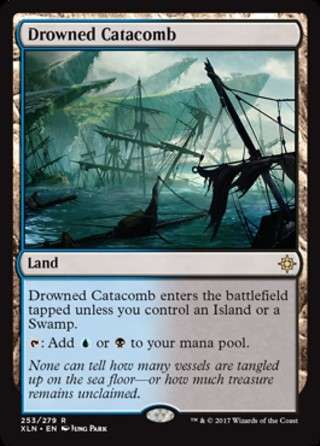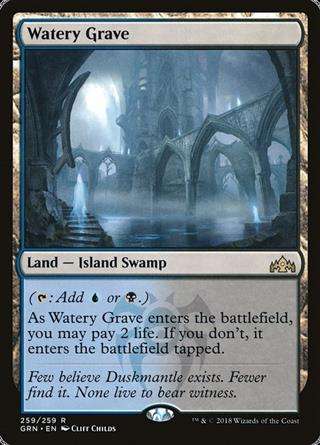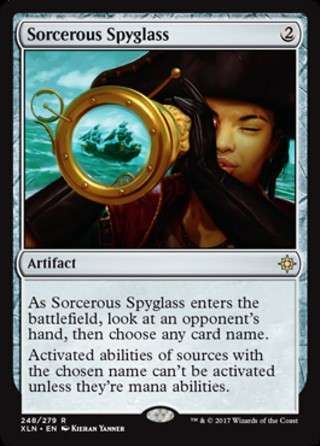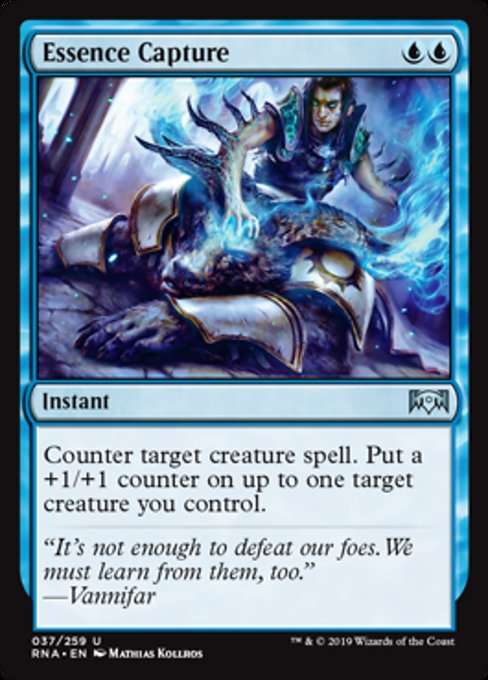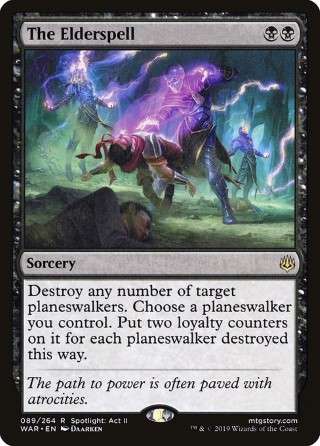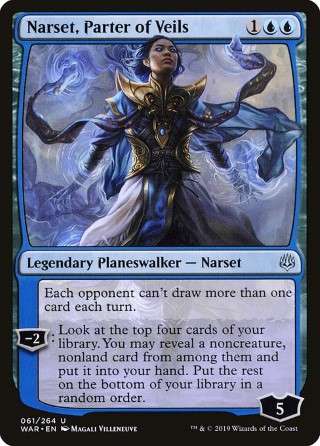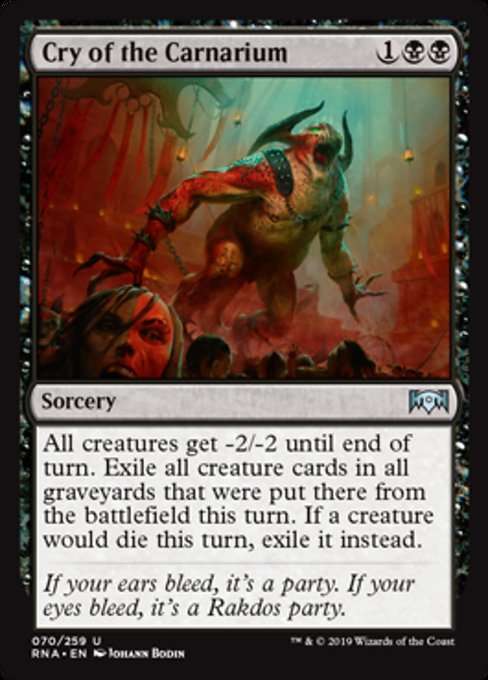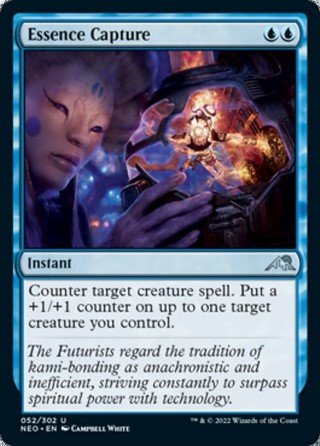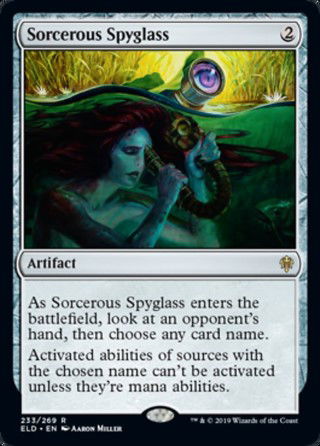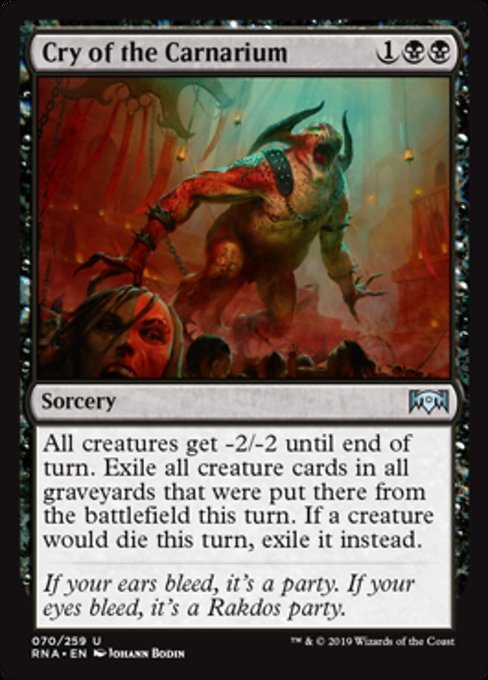Standard - Dimir Diver Duo
- Deck contains 19 invalid cards for this format: Treasure Map // Treasure Cove (XLN), Drowned Catacomb (XLN), Vraska's Contempt (XLN), Karn, Scion of Urza (DOM), Wizard's Retort (DOM), Phyrexian Scriptures (DOM), Watery Grave (GRN), Discovery // Dispersal (GRN), Benthic Biomancer (RNA), Contentious Plan (WAR), Dreadhorde Invasion (WAR), Enter the God-Eternals (WAR), Soul Diviner (WAR), Tyrant's Scorn (WAR), Blast Zone (WAR), Essence Capture (RNA), Cry of the Carnarium (RNA), Narset, Parter of Veils (WAR), The Elderspell (WAR)
Main 60 cards (17 distinct)
| Instant, Sorcery, Enchantment, Artifact (25) | |||
|---|---|---|---|
| $0.60€0.520.02 | |||
| $1.17€1.470.02 | |||
| $0.25€0.100.03 | |||
| $0.29€0.250.03 | |||
| $0.35€0.280.03 | |||
| $0.25€0.170.03 | |||
| $0.75€0.540.02 | |||
| $0.39€0.230.02 | |||
| $0.77€0.490.02 | |||
| Planeswalker (3) | |||
| $3.99€4.670.06 | |||
| Creature (8) | |||
| $0.50€0.290.02 | |||
| $0.38€0.230.02 | |||
| Land (24) | |||
| $0.49€0.380.10 | |||
|
7
Swamp
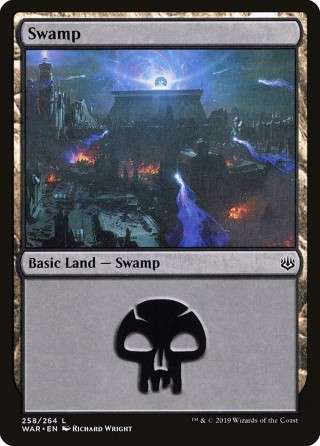
|
$0.20€0.130.04 | ||
|
7
Island
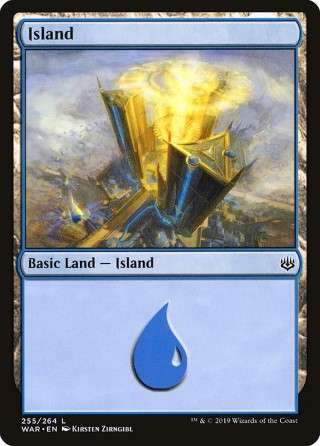
|
$0.19€0.020.03 | ||
| $2.67€1.800.02 | |||
| $13.50€13.600.29 | |||
Side 15 cards (7 distinct)
| $0.30€0.150.02 | |||
|
2
Negate
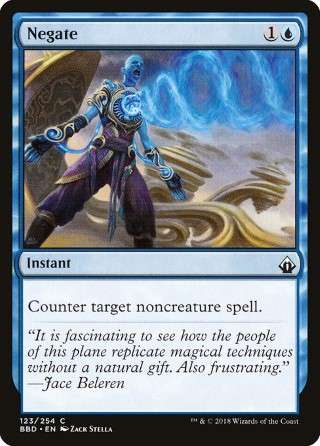
|
$0.25€0.08 | ||
| $0.23€0.140.03 | |||
| $0.21€0.100.03 | |||
|
2
Duress
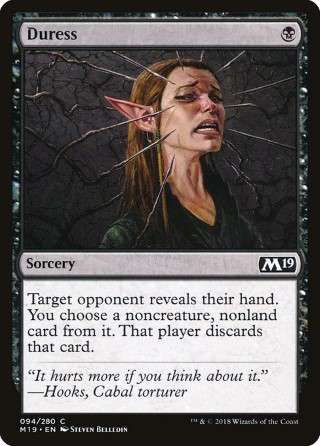
|
$0.20€0.060.03 | ||
| $0.44€0.290.02 | |||
| $0.83€0.740.04 |
(Simplified, true algorithm in MTGA not revealed by Wizards yet)
COMPARE WITH AETHERHUB COLLECTION
Add at least 100 different cards to your collection and set it as your Compare Collection on the manage page to see what cards from this deck you are missing.
COMPARE WITH MTG ARENA COLLECTION
Compare your MTG Arena Collection with AetherHub decklists or any other decks found on the web with the MTGA Assistant extension. Syncing your account will automatically upload your collection so you can see what cards you are missing right here.
Learn more Download For Windows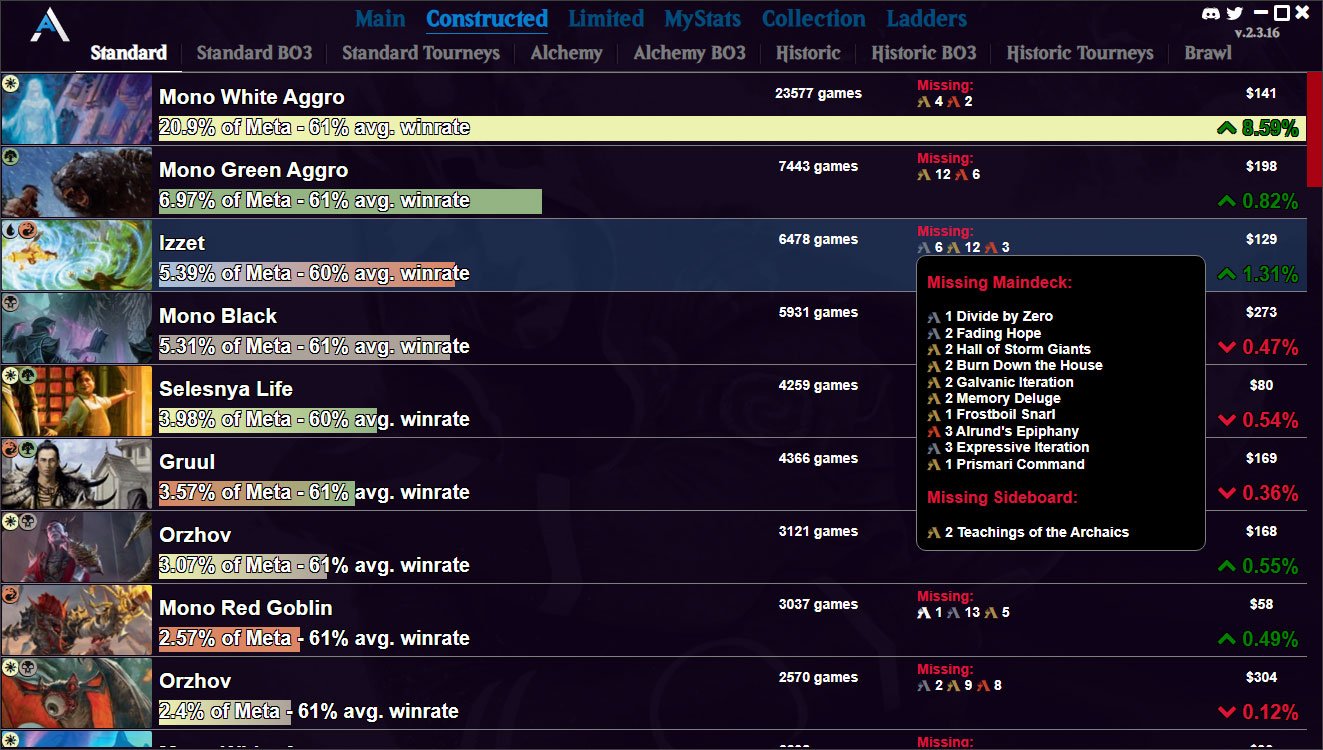
From Reddit, made by JustKachmanastan.
Like effectively all of you, I spent the past few weeks poring over spoilers for cards in War of the Spark, and to no surprise, the set seems incredible. While many of the cards released support pre-existing strategies, and there’s no doubt in my mind that Esper Control will heavily influence the oncoming months, one rather innocuous build around card caught my eye. Normally, build around cards such as Simic Ascendency are hardly competitive-worthy, and almost immediately fall into the pile of ‘fun jank’, I wholeheartedly believe that Soul Diviner, the card which spawned this deck, has a place in the format.
Soul Diviner is a pretty simple card; in most cases, you’re simply tapping to draw an extra card each turn, but where this deck shines is in the subtle synergies and overwhelming engine it supports. So, I’ll first go over the deck’s general philosophy and core, then the list, and finally, some general thoughts.
The Core:
The deck, which I’m calling Dimir Diver Duo, is named such for a pair of cards which consistently impress me, and carry the deck. Benthic Biomancer was talked about a bit in the spoiler thread for Soul Diviner, but I feel it’s remained under peoples’ radars as of late. This merfolk helps to filter through cards, act as an early game body, and most importantly of all, serves as a recursive manasink with Soul Diviner. The Diviner himself is a fantastic body, being a 2/3 for UB, and can block, swing in, and obviously, draw cards. With him and Biomancer on the battlefield, you basically have access to “1U: Draw 2 cards, then discard a card”. While this seems inefficient, the most important part is that it uses no cards in hand; this is an engine which functions independent of your hand’s card advantage.
The rest of the deck is split between efficient removal and threats which work well with Diviner, but perfectly fine on their own. Dreadhorde Invasion might not be bitterblossom, but it absolutely doesn’t have to be. Slowly ticking up for blockers against early aggro, or constant chip damage against control is something to look forward to, and a single Lifelinked swing can immediately win you a race.
The List:
Diver Duo Engine:
4 Benthic Biomancer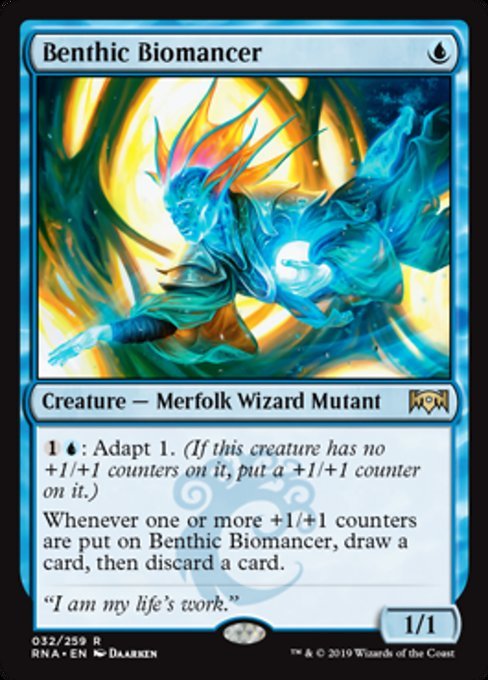 : There’s a lot to say about this card, but much of it has been said above. Biomancer is a perfect fit for the deck, helping to filter for lands in the early game, and filter out lands in the late game, once you get the engine of Soul Diviner online. While he’s susceptible to removal, as a 1/1 or 2/2, if your opponent wastes a card on him, that’s perfectly fine, because that’s one less card they have to deal with Diviner, or a Zombie Army. Biomancer also can act as a mana sink for when you’re holding up mana; the deck runs counterspells and removal aplenty, so in the case you don’t use them, you can just Adapt him. While this does take away from his theoretical damage, it’s significantly more important to prepare for opposing plays than to deal 1 more damage.
: There’s a lot to say about this card, but much of it has been said above. Biomancer is a perfect fit for the deck, helping to filter for lands in the early game, and filter out lands in the late game, once you get the engine of Soul Diviner online. While he’s susceptible to removal, as a 1/1 or 2/2, if your opponent wastes a card on him, that’s perfectly fine, because that’s one less card they have to deal with Diviner, or a Zombie Army. Biomancer also can act as a mana sink for when you’re holding up mana; the deck runs counterspells and removal aplenty, so in the case you don’t use them, you can just Adapt him. While this does take away from his theoretical damage, it’s significantly more important to prepare for opposing plays than to deal 1 more damage.
4 Soul Diviner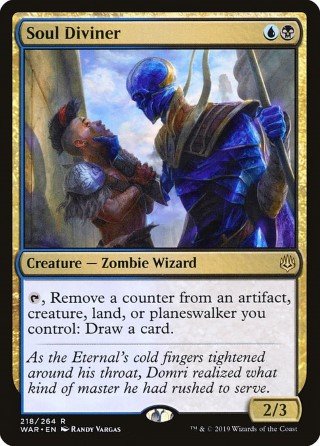 : Soul Diviner is a card I’ve already fallen in love with, because in essence, he’s the perfect fit for a midrangey deck like this. He draws, he blocks well, and he’s a cheap body which doesn’t die to something like Shock or Cry of the Carnarium. We run a lot of solid cards which incidentally have counter-based synergies, such as Karn and the Amass package, so there’s rarely a time when you can’t turn a counter into a card. The only slight against this card is that you can’t remove Lore counters, but that’s understandable, to prevent something like a repeatable Phyrexian Scriptures.
: Soul Diviner is a card I’ve already fallen in love with, because in essence, he’s the perfect fit for a midrangey deck like this. He draws, he blocks well, and he’s a cheap body which doesn’t die to something like Shock or Cry of the Carnarium. We run a lot of solid cards which incidentally have counter-based synergies, such as Karn and the Amass package, so there’s rarely a time when you can’t turn a counter into a card. The only slight against this card is that you can’t remove Lore counters, but that’s understandable, to prevent something like a repeatable Phyrexian Scriptures.
Amass Package:
4 Dreadhorde Invasion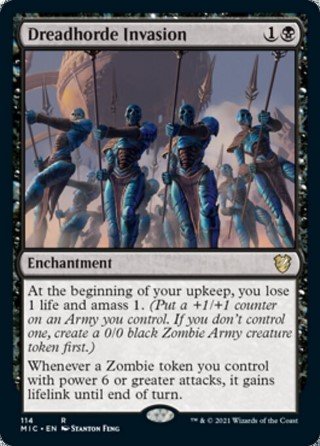 : While Invasion isn’t bitterblossom, there’s still a lot to love about the card, and a lot which differentiates it. Much like its predecessor, Invasion can put up a 1/1 blocker each turn for 1 life, which can stop things such as Adanto Vanguard, various Monored threats, and big non-trampling creatures. In addition, past the 1/1, your +1 power onboard effectively has haste, because instead of creating a new token, you’re pumping the current one. Finally, the Lifelink for 6+ power Tokens is absolutely appreciated, as it helps you to stabilize and race well.
: While Invasion isn’t bitterblossom, there’s still a lot to love about the card, and a lot which differentiates it. Much like its predecessor, Invasion can put up a 1/1 blocker each turn for 1 life, which can stop things such as Adanto Vanguard, various Monored threats, and big non-trampling creatures. In addition, past the 1/1, your +1 power onboard effectively has haste, because instead of creating a new token, you’re pumping the current one. Finally, the Lifelink for 6+ power Tokens is absolutely appreciated, as it helps you to stabilize and race well.
3 Enter the God-Eternals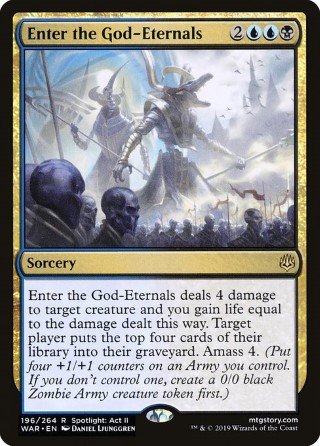 : Enter the GEs is a new, fresh take on Flametongue Kavu, for 5 mana, you’re getting 4 damage, 4 life, and a 4/4 (the mill being unfortunately rather irrelevant, but don’t mill Blue players, to avoid Azcanta). This is a huge swing piece, and if you already control a token due to Invasion, this can often singlehandedly push it to 6 power, and thus, Lifelink. While I could see the list running 2, this card alone can act as a tremendous push for damage and life, helping us again to stabilize.
: Enter the GEs is a new, fresh take on Flametongue Kavu, for 5 mana, you’re getting 4 damage, 4 life, and a 4/4 (the mill being unfortunately rather irrelevant, but don’t mill Blue players, to avoid Azcanta). This is a huge swing piece, and if you already control a token due to Invasion, this can often singlehandedly push it to 6 power, and thus, Lifelink. While I could see the list running 2, this card alone can act as a tremendous push for damage and life, helping us again to stabilize.
Repeatable Counters:
3 Karn, Scion of Urza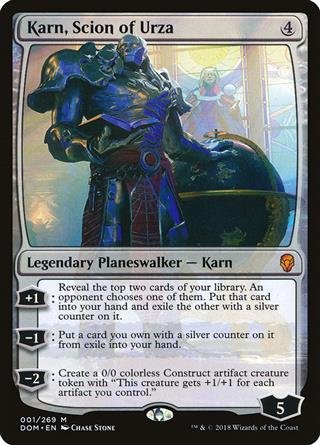 : Karn wins games, though seeing as how we’ve had him since DOM, I assumed that was already known. Karn represents a strange form of +1 card each turn, effectively drawing you a card you want every other turn, and he makes growing Tokens, which can close out games (a vital factor for this deck). Notably, though, Karn starts at a whopping 5 Loyalty, and thus can act as a huge battery for Soul Diviner’s tap effect.
: Karn wins games, though seeing as how we’ve had him since DOM, I assumed that was already known. Karn represents a strange form of +1 card each turn, effectively drawing you a card you want every other turn, and he makes growing Tokens, which can close out games (a vital factor for this deck). Notably, though, Karn starts at a whopping 5 Loyalty, and thus can act as a huge battery for Soul Diviner’s tap effect.
2 Treasure Map // Treasure Cove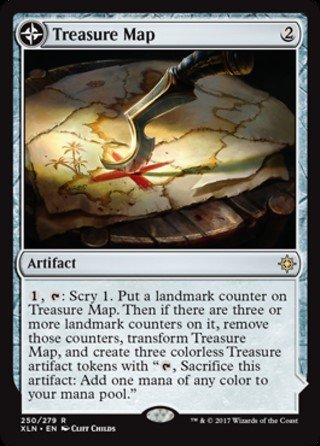 : While you don’t always want to see this, Treasure Map is still a solid include, and can help to filter through draws, and eventually, flip into even more draws for the deck. It turns Soul Diviner’s tap into Opt, and can be jumped to 3 counters off of 1 from Contentious Plan. Overall, a really solid card, though you don’t want to see it in multiples, if you can help it.
: While you don’t always want to see this, Treasure Map is still a solid include, and can help to filter through draws, and eventually, flip into even more draws for the deck. It turns Soul Diviner’s tap into Opt, and can be jumped to 3 counters off of 1 from Contentious Plan. Overall, a really solid card, though you don’t want to see it in multiples, if you can help it.
Draw:
4 Discovery // Dispersal: Similar to a lot of lists with access to it, this deck benefits from 2-mana Preordain, and given how grindy it can be, you’re also happy to cast Dispersal on occasion. It helps to find your answers, dig for engine pieces, and overall is a card you’d want to have access to as much as possible.
2 Contentious Plan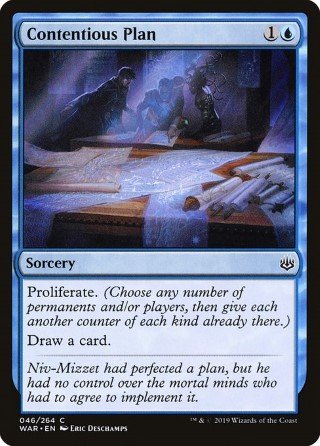 : I really wish this was an Instant, but as it is, Plan serves an important role in the deck as a way to recharge our counter-laden batteries. It can pump up Karn, Map, Biomancer (looting us a card), our Army, and even Phyrexian Scriptures. While it can seem janky, we have enough payoffs to make a proliferate which breaks even a worthwhile card.
: I really wish this was an Instant, but as it is, Plan serves an important role in the deck as a way to recharge our counter-laden batteries. It can pump up Karn, Map, Biomancer (looting us a card), our Army, and even Phyrexian Scriptures. While it can seem janky, we have enough payoffs to make a proliferate which breaks even a worthwhile card.
Removal/Interaction:
4 Wizard's Retort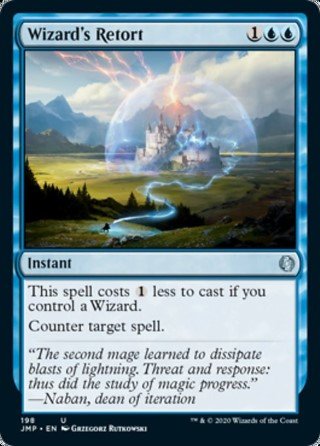 : Similar to Monored, with 8 total wizards and 4 Lightning, and Monoblue, with 8 total wizards and 4 Retort, this deck also runs 8 wizards through Benthic Biomancer and Soul Diviner, coincidentally, and thus, we’re also on the faux-counterspell plan. Retort is an amazing card, due to how often we’re looking to see our Wizards in particular, and even at 3 mana it fills a slot in our curve otherwise left barren.
: Similar to Monored, with 8 total wizards and 4 Lightning, and Monoblue, with 8 total wizards and 4 Retort, this deck also runs 8 wizards through Benthic Biomancer and Soul Diviner, coincidentally, and thus, we’re also on the faux-counterspell plan. Retort is an amazing card, due to how often we’re looking to see our Wizards in particular, and even at 3 mana it fills a slot in our curve otherwise left barren.
2 Tyrant's Scorn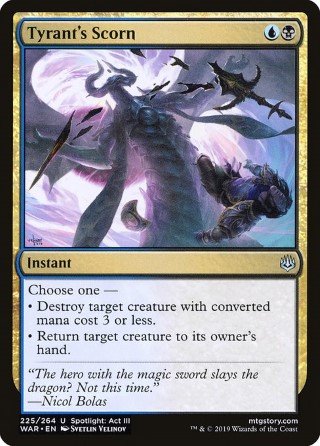 : While it’s meta-dependent on whether Cast Down is simply better, I believe that Scorn has a place in this list, and in decks running UB. Legends have been appearing a ton in my testing, such as Lyra, Tolsimir, and more, which turns Cast Down into a dead card. Scorn also can bounce back Rekindling Phoenix, which is a mode you’ll use often against something like Gruul Monsters or Big Red. Overall I’ve been happy with the card, and I believe it’ll see a ton of play.
: While it’s meta-dependent on whether Cast Down is simply better, I believe that Scorn has a place in this list, and in decks running UB. Legends have been appearing a ton in my testing, such as Lyra, Tolsimir, and more, which turns Cast Down into a dead card. Scorn also can bounce back Rekindling Phoenix, which is a mode you’ll use often against something like Gruul Monsters or Big Red. Overall I’ve been happy with the card, and I believe it’ll see a ton of play.
2 Vraska's Contempt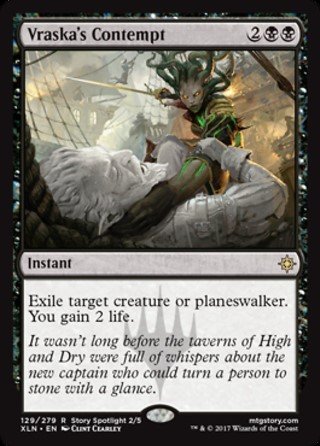 : Contempt has been good for a while, and with the amount of Planeswalkers-per-deck increasing, there’s not a chance Contempt’s play will decrease. It kills Teferis, Jaces, Saheelis, etc etc, and Rekindling Phoenixes as well. It can beat back races with its 2 life, and handle basically any major threat for 4 mana. If you don’t know how good Contempt is, especially at this point, I’d see a doctor.
: Contempt has been good for a while, and with the amount of Planeswalkers-per-deck increasing, there’s not a chance Contempt’s play will decrease. It kills Teferis, Jaces, Saheelis, etc etc, and Rekindling Phoenixes as well. It can beat back races with its 2 life, and handle basically any major threat for 4 mana. If you don’t know how good Contempt is, especially at this point, I’d see a doctor.
2 Phyrexian Scriptures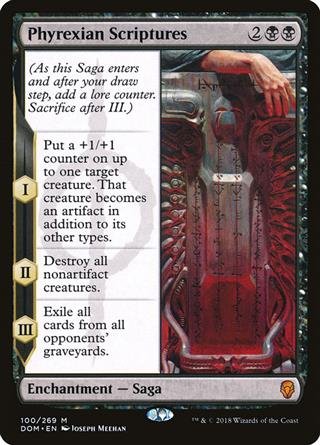 : This is the card I’ve been asked the most questions about, because a wrath with suspend one seems eerily unplayable. However, in this deck, it does a few things. First, it turns one creature into a wrath-proof body, and can Loot with Biomancer. It makes Diviner bolt-immune, and your Zombie Army closer to 6 power. Second, people play conservatively for a turn after you play this, if they lack immediate enchantment removal, which can help grind out the game and allow for your engine to continue its work. Finally, GY removal can stop Azcantas, amongst other things, and Scriptures can be proliferated. If the wrath was instantaneous, it’d be better, but in my testing, there is a place for Scriptures in this list, as a way to chokehold aggro for even just a moment.
: This is the card I’ve been asked the most questions about, because a wrath with suspend one seems eerily unplayable. However, in this deck, it does a few things. First, it turns one creature into a wrath-proof body, and can Loot with Biomancer. It makes Diviner bolt-immune, and your Zombie Army closer to 6 power. Second, people play conservatively for a turn after you play this, if they lack immediate enchantment removal, which can help grind out the game and allow for your engine to continue its work. Finally, GY removal can stop Azcantas, amongst other things, and Scriptures can be proliferated. If the wrath was instantaneous, it’d be better, but in my testing, there is a place for Scriptures in this list, as a way to chokehold aggro for even just a moment.
Lands (24):
4 Watery Grave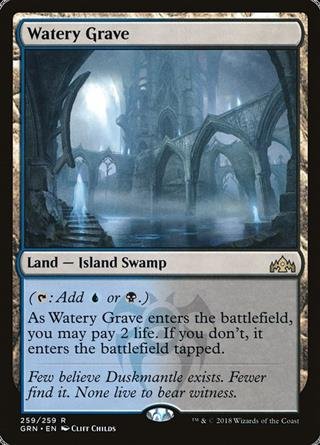 , 4 Drowned Catacomb
, 4 Drowned Catacomb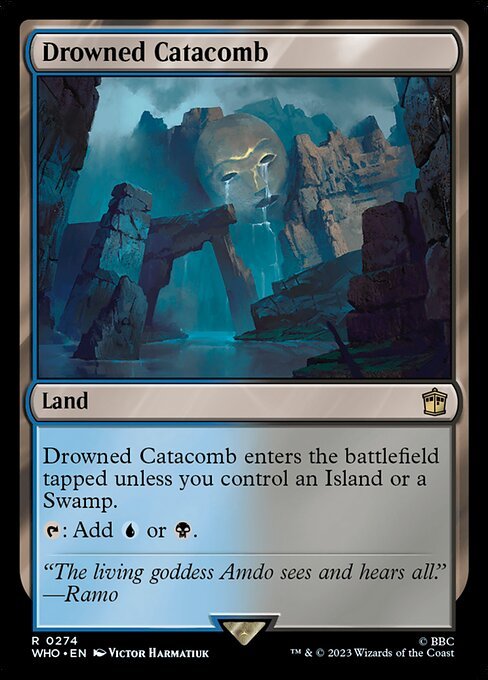 , 7 Island, 7 Swamp
, 7 Island, 7 Swamp
2 Blast Zone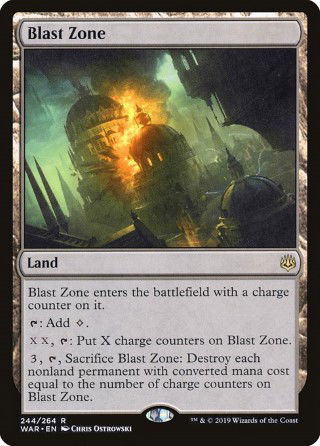 : This card is part of why I started to work on the deck, and let me tell you, it’s the real deal. Being able to play land-based Ratchet Bomb in standard makes me feel like I’m playing land-based Shock in Standard, and Ramunap Ruins proved how brutal that can be. One common complaint is that you can’t hit tokens, but Soul Diviner turns that argument on its head, allowing for that with ease. While susceptible to Field of Ruin, overall, the card is nuts, and the deck plays enough Colorless cards, such as Treasure Map and Karn, to the point where a colorless land doesn’t hurt all that much. We’re looking to grind out, and manafixing isn’t hard with the amount of draw and filtering the deck has.
: This card is part of why I started to work on the deck, and let me tell you, it’s the real deal. Being able to play land-based Ratchet Bomb in standard makes me feel like I’m playing land-based Shock in Standard, and Ramunap Ruins proved how brutal that can be. One common complaint is that you can’t hit tokens, but Soul Diviner turns that argument on its head, allowing for that with ease. While susceptible to Field of Ruin, overall, the card is nuts, and the deck plays enough Colorless cards, such as Treasure Map and Karn, to the point where a colorless land doesn’t hurt all that much. We’re looking to grind out, and manafixing isn’t hard with the amount of draw and filtering the deck has.
The Sideboard:
The sideboard is a work in progress, and will change depending on meta and further testing. Due to the deck running 3 Enter the GEs, and a wrath, we have a package to help against creatureless control, such as Negates, Elder Spells, and more. Furthermore, the Essence Captures are there for Gruul (though we keep retorts for the anti-counter stuff they have). Narset is a card for Gates, and any crazy Expansion//Explosion deck, but it also helps against Teferi, and Cry of the Carnarium is our sole, brutal card for Monowhite or Monored aggros.
2 Negate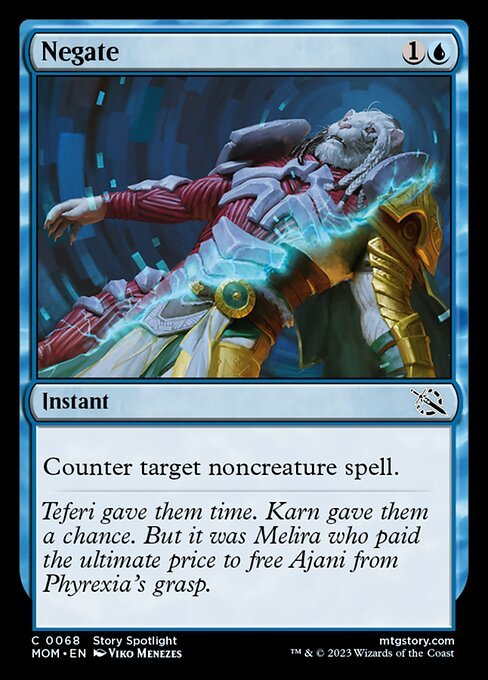
2 The Elder Spell
2 Duress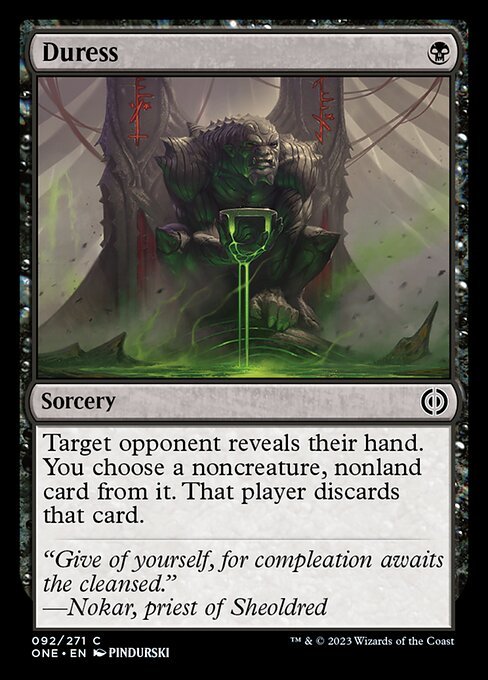
Closing Thoughts:
I can’t really talk much about Matchups yet, though in testing, some general thoughts on the matter are as such:
Gruul Monsters: Pretty easy as long as you’re able to stabilize, though trying to get a Phyrexian Scriptures off is vital to closing out games.
Non-Esper UWx Control: A bit harder, though fogs don’t really scare us, and if the deck is relying on Teferi or Krasis to win, they’re remarkably easy to deal with.
Esper: Around 50/50, from what I’ve tested, but being able to land a Dreadhorde Invasion early is usually how you’re going to win. Be prepared for wraths, and don’t overcommit to your engine.
Gates: Narset is nuts in this matchup, but baseline, it’s about 60//40 us. We can deal with Colossi or Rams, but due to our deck naturally wanting to go into the late game, we suffer when they’re able to truly go wild.
Monored: You’re going to lose g1, a lot of the time, but Soul Diviner is the perfect blocker for this matchup, though he’s often bolt bait. Once you side in Cries, you should have an easier time. 45/55
Monowhite/UW splash Aggro: This is by far our worst matchup, from what I’ve tried. They usually come in too quickly, and an anthem outraces any chance at stabilization. Cries help, but a lot of the time, you’re scrambling to try and just not die. 20/80
GBx Midrange: The game will go long, but Blast Zone and other removals that go beyond 1-for-1 will carry you through the game. You can outdraw them, but be careful not to let Wildgrowth put their life total out of reach. 50/50
Monoblue: WIth efficient removal, a lot of which lines up well against their suite of creatures, I believe that this is surprisingly a really close matchup. If Monoblue is super prevalent, I’d maybe look to board more Tyrant’s Scorn, because that card is perfect for efficiently removing boosted creatures.
Other midrange: As long as you keep card advantage up, you’ll outvalue most other midrange decks from what I’ve seen, which is absolutely helpful. Soul Diviner+Biomancer is your best friend. 60/40
Ral Copycast/Combo: I haven’t run into this deck, but hypothetically, it all depends on whether we immediately are able to deal with Ral. If not, game over, usually.
UR Phoenix: It can be tough, but if you’re able to stabilize and even land a Cry on their birds, you can win without much issue. 50/50.
Overall I started the deck thinking I’d be unimpressed, due to the seemingly-janky, engine-focused nature of it, but honestly I’ve left rather satisfied. Soul Diviner isn’t just a durdly Phyrexian Arena on legs, he’s really, really good. Most of the deck is able to carry its own weight, independent of the Diver Duo engine, and only becomes better with them onboard. While I don’t think it’s going to be top, top tier, this is a scrappy rogue contender which definitely could see top tables.
Edit: I'm now trying a ratio of 2:1 Karn:Kefnet, due to some great points made by people here. Kefnet seems to be hard to deal with, with a ton of value, and our ability to instant-speed draw on demand pairs will with his triggered copy effect. That being said, I'm leery of >1, just because he seems rather bricky in multiples, even if we can loot him away.
30 comments
share
save
hid
Founder and CEO of AetherHub.com, he likes to play with fire and also has a Twitter account he posts his stuff on. If you are interested in supporting him on Patreon you will also receive an AetherHub.com premium subscription!
"Nuts & Bolts Spike spends his energy looking within. He tries to understand his own internal flaws and works to improve them"
Latest Articles
| 16 | 10 | 29 | 5 | 0 |
|---|---|---|---|---|
| 4 | 8 | 3 | 0 | 0 |
| Symbols | Percentage | Lands |
|---|

